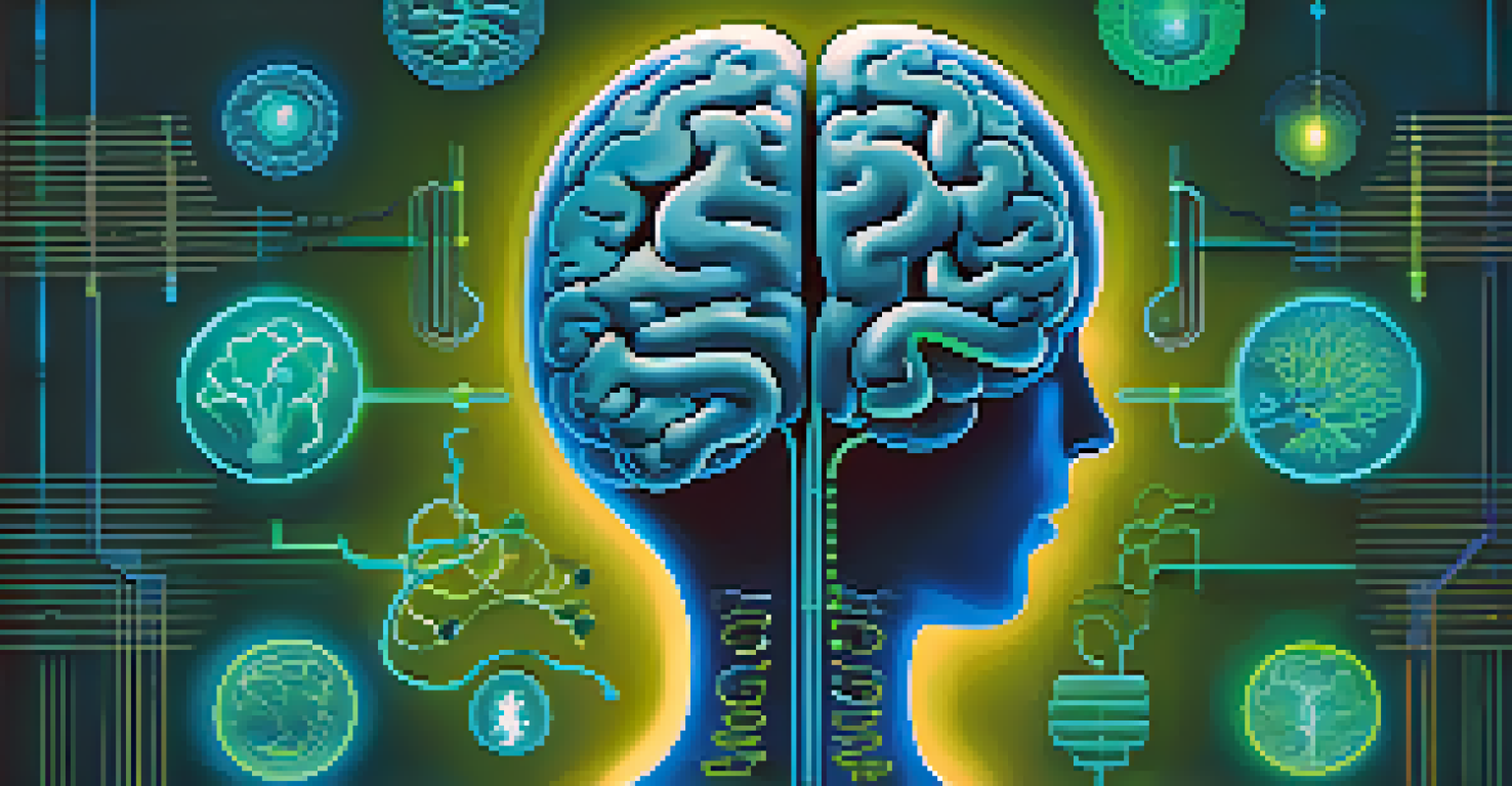The Connection Between Gut Health and Mental Wellness

Understanding Gut Health: What It Really Means
Gut health refers to the balance of microorganisms living in our digestive tract. This balance is crucial because it influences everything from digestion to immune response. A healthy gut is often characterized by a diverse microbiome, which plays a vital role in our overall health.
All disease begins in the gut.
When we talk about gut health, we often think of foods that promote it, like yogurt or fiber-rich vegetables. These foods help nourish the beneficial bacteria in our gut, promoting a thriving microbiome. But it's not just about what we eat; lifestyle factors, such as stress and sleep, also play a significant role.
Ultimately, maintaining good gut health requires a holistic approach—one that combines a balanced diet, regular exercise, and stress management. When we take care of our gut, we set the foundation for better health outcomes, including mental wellness.
The Gut-Brain Connection: How They Communicate
The gut and brain communicate via what's known as the gut-brain axis, a complex network of signals that influences our mood and behavior. This connection means that what happens in our gut can significantly affect our mental state. For instance, when we experience gut discomfort, it can lead to feelings of anxiety or irritability.

Studies have shown that the gut produces a large percentage of the body's serotonin, a neurotransmitter that plays a key role in mood regulation. This means that a healthy gut can contribute to higher serotonin levels, which may help alleviate symptoms of depression and anxiety. It's a fascinating link that highlights the importance of gut health in mental wellness.
Gut Health Affects Mental Wellness
A healthy gut microbiome is essential for optimal mental health, influencing mood and cognitive function.
In essence, the gut-brain connection is a two-way street. Just as our gut can influence our mental state, our thoughts and emotions can impact gut health. Stress, for example, can disrupt the balance of gut bacteria, leading to digestive issues and further mental distress.
The Role of Gut Bacteria in Mental Health
Our gut is home to trillions of bacteria, and research suggests that these microorganisms play a significant role in our mental health. Different strains of bacteria can produce various neurotransmitters and short-chain fatty acids that influence mood and cognition. For instance, certain probiotics have been linked to reduced anxiety and improved mood.
The mind and body are not separate. What affects one, affects the other.
The diversity of gut bacteria is crucial; a more diverse microbiome is often associated with better mental health outcomes. Conversely, a lack of diversity can lead to dysbiosis, a condition that has been linked to increased symptoms of depression and anxiety. This underscores the importance of nurturing a healthy gut.
Incorporating fermented foods like sauerkraut, kimchi, and kefir can help boost gut bacteria diversity. By enriching your diet with these foods, you’re not just supporting your digestive health but potentially enhancing your mental well-being as well.
Dietary Choices: Foods that Support Gut and Mental Health
Diet plays a crucial role in both gut health and mental wellness. Foods rich in fiber, such as fruits, vegetables, and whole grains, help feed beneficial gut bacteria. These foods not only support digestion but can also improve mood and mental clarity.
In addition to fiber, incorporating omega-3 fatty acids found in fatty fish like salmon can be beneficial. Omega-3s are known to have anti-inflammatory properties, which can positively impact both gut and brain health. A diet that prioritizes these nutrients can foster a healthier gut-brain connection.
Diet Influences Gut and Brain
Nutrient-rich foods, particularly those high in fiber and omega-3 fatty acids, support both gut health and mental clarity.
It's also wise to minimize processed foods and sugars, as these can disrupt gut microbiota balance and lead to inflammation. By making mindful dietary choices, you can support both your gut and your mental health, creating a positive feedback loop for overall wellness.
The Impact of Stress on Gut Health and Mental Wellness
Stress can have a profound effect on gut health, and understanding this relationship is key. When we experience stress, our body releases hormones like cortisol, which can disrupt the gut microbiome. This disruption may lead to digestive issues and can further exacerbate feelings of anxiety and depression.
Moreover, chronic stress can lead to unhealthy coping mechanisms, such as overeating or consuming comfort foods that are often high in sugar and fat. These choices can create a vicious cycle, where poor gut health leads to increased stress levels and vice versa.
To break this cycle, it’s essential to adopt stress management techniques such as mindfulness, yoga, or deep breathing exercises. By prioritizing mental wellness, you not only improve your emotional health but also create a more favorable environment for your gut health.
The Benefits of Probiotics for Mental Health
Probiotics are live microorganisms that can provide health benefits when consumed in adequate amounts. They play a crucial role in enhancing gut health, which in turn can support mental wellness. Research has indicated that certain probiotic strains may help alleviate symptoms of depression and anxiety.
Incorporating probiotics into your diet can be as simple as enjoying a serving of yogurt, or you might consider taking a supplement. However, it's essential to choose high-quality products that contain strains known to benefit mental health, such as Lactobacillus and Bifidobacterium.
Stress Impacts Gut Microbiome
Chronic stress can disrupt gut health, leading to digestive issues and exacerbating anxiety and depression.
While probiotics can be beneficial, they work best in conjunction with a balanced diet and healthy lifestyle. By taking a comprehensive approach to gut health, you can create a powerful ally for your mental wellness.
Conclusion: Nurturing Your Gut for Better Mental Health
The connection between gut health and mental wellness is a fascinating area of research that emphasizes the importance of a holistic approach to health. By understanding how our gut and brain communicate, we can make informed choices that enhance both our physical and mental well-being. A healthy gut can lead to a healthier mind.
Incorporating dietary changes, managing stress, and potentially adding probiotics to your routine are all steps you can take toward improving your gut health. Remember, nurturing your gut is not just about digestion; it’s about fostering a positive mental state.

As we continue to learn more about this connection, it becomes increasingly clear that taking care of our gut is an essential part of taking care of ourselves. So, why not start today? Your gut—and your mind—will thank you.